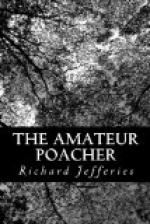The path leads presently into a beautiful park, the only defect of which is that it is without undulation. It is quite level; but still the clumps of noble timber are pleasant to gaze upon. In one spot there still stands the grey wall and buttress of some ancient building, doubtless the relic of an ecclesiastical foundation. The present mansion is not far distant; it is of large size, but lacks elegance. Inside, nothing that modern skill can supply to render a residence comfortable, convenient, and (as art is understood in furniture) artistic has been neglected.
Behind the fir plantations there is an extensive range of stabling, recently erected, with all the latest improvements. A telegraph wire connects the house with the stable, so that carriage or horse may be instantly summoned. Another wire has been carried to the nearest junction with the general telegraphic system; so that the resident in this retired spot may communicate his wishes without a moment’s delay to any part of the world.
In the gardens and pleasure-grounds near the house all manner of ornamental shrubs are planted. There are conservatories, vineries, pineries; all the refinements of horticulture. The pheasants stray about the gravel walks and across the close-mown lawn where no daisy dares to lift its head. Yet, with all this precision of luxury, one thing is lacking—the one thing, the keystone of English country life—i.e. a master whose heart is in the land.
The estate is in process of ‘nursing’ for a minor. The revenues had become practically sequestrated to a considerable extent in consequence of careless living when the minor nominally succeeded. It happened that the steward appointed was not only a lawyer of keen intelligence, but a conscientious man. He did his duty thoroughly. Every penny was got out of the estate that could be got, and every penny was saved.
First, the rents were raised to the modern standard, many of them not having been increased for years. Then the tenants were in effect ordered to farm to the highest pitch, and to improve the soil itself by liberal investment. Buildings, drains, and so forth were provided for them; they only had to pay a small percentage upon the money expended in construction. In this there was nothing that could be complained of; but the hard, mechanical, unbending spirit in which it was done—the absence of all kind of sympathy—caused a certain amount of discontent. The steward next proceeded to turn the mansion, the park, home farm, and preserves into revenue.
Everything was prepared to attract the wealthy man who wanted the temporary use of a good country house, first-class shooting and hunting. He succeeded in doing what few gentlemen have accomplished: he made the pheasants pay. One reason, of course, was that gentlemen have expenses outside and beyond breeding and keeping: the shooting party itself is expensive; whereas here the shooting party paid hard cash for their amusement. The steward had no knowledge of pheasants; but he had a wide experience of one side of human nature, and he understood accounts.




